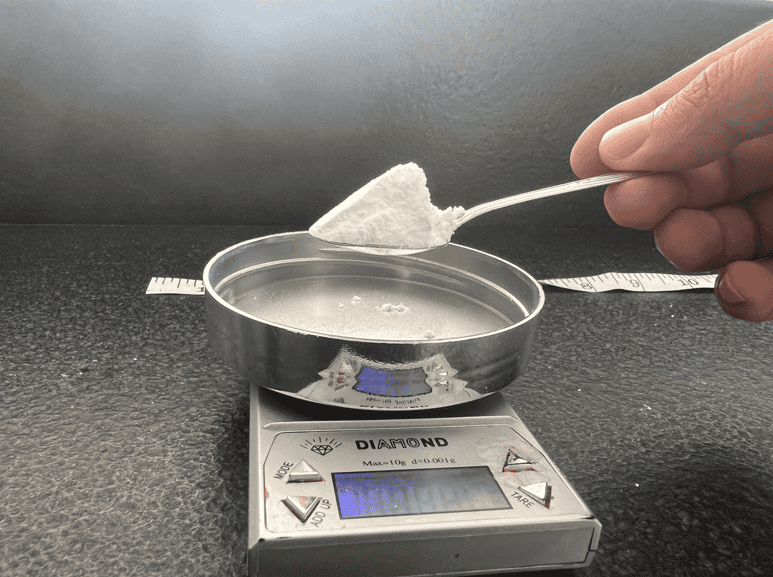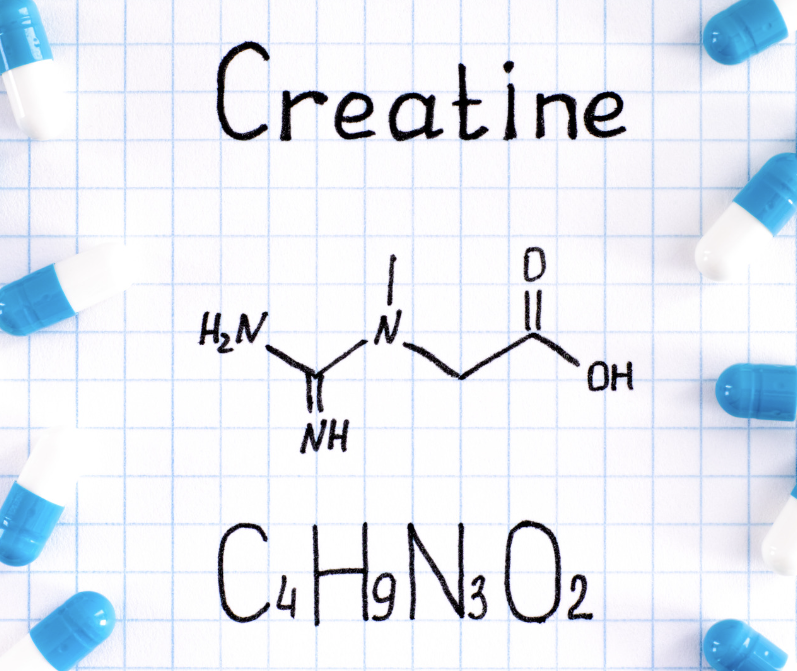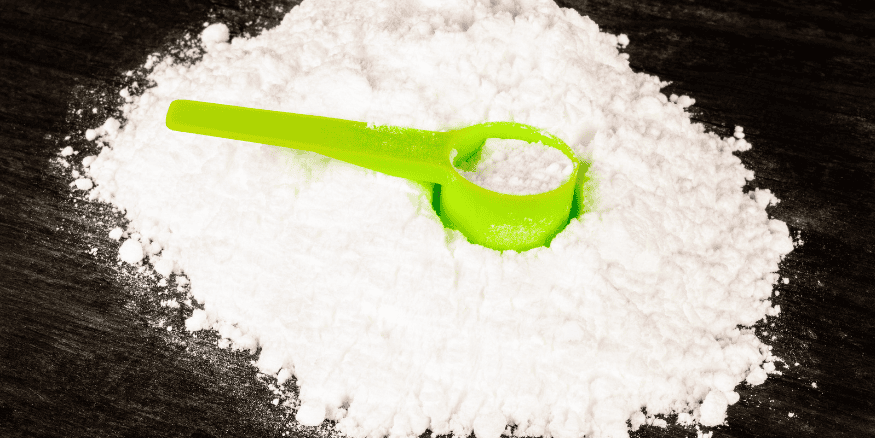
You've probably heard of creatine...
It's a popular supplement among athletes, is known for its ability to enhance physical performance and muscle growth.
However, a question that pops up is:
Does creatine make you poop?
This article dives into this topic, so we can see if there's a connection between between creatine and digestion.
So, you're wondering if creatine makes you poop more?
Well, the answer is yes, for some people.
It all comes down to how your body processes the supplement.
Factors like your digestive health, the quality of the creatine, and your dosage can all play a role.
But remember, everyone's body is unique, so it's all about finding what works for you.

Diarrhea can occur with creatine use, particularly during the loading phase or from overdosing.
Doses above 10 grams of creatine in a single sitting may increase incidents of diarrhea.
If diarrhea persists past the loading phase, it is advisable to consult a healthcare professional.
Creatine is a nitrogenous organic acid that's crucial for supplying energy to our cells, especially those muscle cells.
You'll find it naturally in foods like red meat and fish, but your body also has the ability to produce it.
And, of course, it's widely available as a supplement.
But here's where the plot thickens.
When you ingest creatine, your body absorbs it, and sometimes, it can act like a laxative.
This means it might lead to increased bowel movements in some individuals.
You might be wondering, why does this happen?
Well, it all boils down to how your body processes the creatine.
The absorption process is a complex interplay involving your digestive health, the quality of the creatine supplement you're taking, and the dosage.
Each of these factors can influence how creatine interacts with your bowel movements.
For instance, if your digestive health is compromised, you might find that creatine affects you differently.
Similarly, the quality of your creatine supplement can play a role.
If it's a low-quality supplement, it might not be absorbed as effectively, leading to increased bowel movements.
And then there's the dosage.
If you're taking a high dose of creatine, it could potentially act as a laxative, leading to increased bowel movements.
So, as you can see, the relationship between creatine and digestion is a complex one.
But it's also a fascinating one, offering insights into how our bodies process and utilize this important substance.
Creatine is absorbed in the body through the intestines and into the bloodstream.
This absorption process can sometimes act as a laxative, causing increased bowel movements.
The interaction between creatine and bowel movements can be influenced by several factors, including individual digestive health, the quality of the creatine supplement, and the dosage.
To avoid constipation and diarrhea, it is recommended to regulate the dosage of creatine and increase fluid intake.
This ensures that the body has enough water to process the creatine and maintain regular bowel movements.
Some users claim that creatine makes them poop more often.
This may be common at the beginning of the loading phase but should taper off after the loading phase.
So, there you have it.
The complex, fascinating relationship between creatine and your bowel movements.
Hydration and Creatine
To avoid constipation, it's essential to stay hydrated.
Drinking plenty of water helps keep your bowels moving and prevents dehydration, which can be caused by undissolved creatine.
Importance of Fiber in Diet
Including high-fiber foods in your diet can also help prevent constipation.
Fiber is known for its ability to regulate bowel movements and can be beneficial when taking creatine.

Creatine intake should not cause blood in stool.
If this occurs, it is crucial to seek immediate medical attention as it may indicate a more serious underlying condition.
There have been reports of smellier bowel movements after taking creatine.
However, creatine in isolation will not make poop smell bad. If you notice a significant change in the smell of your stool, it may be due to other factors in your diet or health.
Creatine does not make you poop water.
If you experience watery stools while taking creatine, it could be due to other factors such as diet or illness, and you should consult a healthcare professional.
Ever heard of the creatine loading phase?
It's a common practice among creatine users.
But what exactly is it? And more importantly, could it be the reason behind your frequent trips to the bathroom?
The creatine loading phase is a period of 5-7 days where you take high doses of creatine to quickly increase the stores in your muscles.
Typically, you'd consume up to 20-25g of creatine per day during this phase.
(See: What Does 5g Creatine Look Like?)
Sounds intense, right?
But it's the quickest way to reap the benefits of creatine supplementation.
Now, let's address the elephant in the room.
Does the creatine loading phase make you poop? Well, it could.
Ingesting this amount of creatine could overwhelm your gastrointestinal tract.
This could lead to some, let's say, hectic sessions on the toilet.
Research has shown that creatine intake in excess of 10g a day increased the risk of diarrhea.
So, if you're experiencing frequent bowel movements during your loading phase, this could be why.
Potential Side Effects of Creatine Supplementation
But let's not stop at bowel movements. Creatine, like any supplement, can have side effects. And it's important to be aware of them.
One of the most common side effects of creatine is bloating and fluid retention.
This is especially common during the loading phase. But don't worry, it's not as bad as it sounds.
In fact, this water retention is partly why creatine users experience great athletic performance increases.
However, there are other side effects to be aware of.
Some people may experience stomach pain, nausea, and muscle cramping.
These are usually mild and go away as your body adjusts to the supplement.
In rare cases, creatine can cause more serious side effects like kidney damage.
This is more likely if you have pre-existing kidney problems or if you're taking high doses of creatine for extended periods.
So, what's the takeaway here?
Creatine is a powerful supplement that can enhance your athletic performance.
But like anything, it should be used responsibly.
Listen to your body, adjust your dosage as needed, and always stay hydrated. And remember, if you have any concerns, don't hesitate to consult with a healthcare professional.
Common side effects of creatine use include bloating and fluid retention.
These side effects mostly stem from incorrect dosage.
However, the water retention due to creatine use can be beneficial as it aids in muscle growth and recovery.

So, you've started taking creatine and you've noticed a change in your bowel movements.
Maybe you're going to the bathroom more often, or perhaps the consistency of your stool has changed.
Don't panic.
This is a common side effect and there are steps you can take to manage it.
Firstly, remember that hydration is key.
Creatine pulls water into your muscles, which can lead to dehydration if you're not drinking enough.
So, make sure you're drinking plenty of water throughout the day.
This will not only help your body process the creatine, but it can also help maintain regular bowel movements.
Secondly, consider adjusting your dosage.
If you're taking a high dose of creatine and experiencing digestive issues, it might be worth reducing your intake.
Remember, more isn't always better when it comes to supplements.
Taking the recommended dosage for your body and goals can help minimize side effects and maximize benefits.
Thirdly, pay attention to your diet.
Including high-fiber foods in your diet can help regulate your bowel movements and prevent constipation.
Foods like fruits, vegetables, whole grains, and legumes are all excellent sources of fiber.
Lastly, if you're still experiencing issues, it might be worth talking to a healthcare professional.
They can provide personalized advice and guidance based on your individual health needs and goals.
Remember, everyone's body reacts differently to supplements.
What works for one person might not work for another.
So, listen to your body, make adjustments as needed, and don't be afraid to seek professional advice if you're unsure.
Is creatine hard to digest?
Dietary supplements, including creatine, can be hard to digest, leading to slowed digestion and bloating. However, creatine monohydrate is considered one of the safest and easiest to digest of all the creatine derivatives.
Can you take creatine on an empty stomach?
It's generally better to take creatine with food, specifically with some carbs and fats. This can help with the absorption of creatine and reduce the risk of stomach discomfort. (Read: Should you take pre-workout on an empty stomach?)
How do I stop creatine bloating?
Bloating is common when starting with creatine. You can reduce bloating by cutting back on your creatine intake during the first few days, also known as "skipping the loading phase."
Does creatine help digestion?
No, creatine does not have any positive benefits on digestion. In fact, it can slow down digestion and lead to constipation or diarrhea.
Is it OK to take creatine every day?
Yes, it's OK to take creatine every day. A typical creatine usage cycle involves taking creatine daily for 6 weeks, followed by a break.
Does creatine affect your bowels?
Yes, creatine can affect your bowels. Some people may experience constipation, while others may have loose stools or diarrhea. This is due to the impact of creatine on digestion.
When should I stop taking creatine?
It's recommended to take breaks from creatine supplementation every 4-6 weeks for maximum efficiency and to give your body a break. However, if you discover you have any kidney or renal disease, you should discontinue creatine immediately.
Does creatine cause weight gain?
Yes, creatine can cause weight gain due to fluid retention. This is a common occurrence when starting with creatine and is usually temporary.
Can creatine cause muscle cramps?
Yes, creatine can cause muscle cramps. This is often due to an imbalance of vitamins, minerals, and water in the body, especially during strenuous workouts.
Why do I need to drink a lot of water with creatine?
Creatine pulls water into your muscles, which can lead to dehydration if you don't drink enough water. Drinking plenty of water helps your body absorb and use creatine more effectively.
Can creatine cause bloating?
Yes, bloating is a common side effect of creatine, especially for those new to the supplement or starting a new cycle. This is usually due to the creatine pulling water into your muscles, which can cause your stomach to feel uncomfortable.
Can I take creatine on an empty stomach?
While it's not harmful to take creatine on an empty stomach, it's generally better to take it with food. This can help with the absorption of creatine and reduce the risk of stomach discomfort.
Does creatine help with digestion?
No, creatine does not have any positive benefits on digestion. In fact, it can slow down digestion and lead to constipation or diarrhea.
Is it safe to take creatine every day?
Yes, it's safe to take creatine every day as part of a typical creatine usage cycle, which involves taking creatine daily for 6 weeks, followed by a break. However, always follow the recommended dosage for your body and goals to avoid potential side effects.
And there you have it - the inside scoop on creatine and its potential effects on your bowel movements.
Yes, it can cause some changes in your digestion, but with the right strategies, these are usually manageable.
Keep yourself hydrated, be mindful of your dosage, and don't underestimate the power of a good diet.
And remember, if you're ever in doubt, don't hesitate to consult a healthcare professional.
After all, when it comes to your health, you're the boss.
Useful Links
 About FitFrek
About FitFrekFitFrek operates as an independent platform, offering comprehensive workouts, programs, routines, guides, and unbiased reviews to accelerate your progress. We pride ourselves on our honesty, delivering straightforward and candid insights. FitFrek does not offer medical advice, diagnosis, or treatment services.